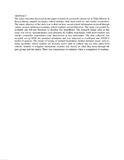| dc.description.abstract | The study outcomes discussed in this paper is based on a research
carried out in
Thika
District
in Kenya
among sampled secondary school students, their head teach
ers and
teacher counsellors. The major objective of the study was to find out how sexual related
information received through various sources influence secondary school students sexual
behaviour.
The study was guided by available and relevant literature to
develop five
hypotheses.
The research design used in this study was survey. Questionnaires were prepared for
student respondents while head teachers and teacher counsellor respondents were
interviewed as key informants. The data collected was recorded usi
ng SPSS for statistical
tabulation and was subjected to coefficient and ANOVA model of analysis. The results of
testing of outlined hypothesis yielded pertinent issues such as; many secondary school
students are sexually active with or without any sex educ
ation from schools, families or
religious institutions; students rely mostly on what they learn through the peer groups and
the media. There was concurrence on opinions when a comparison of students’ views on
the matter with those of the teachers was done.
The study confirmed that there is a strong
relationship between sexual behaviour and the amount of information available. The
source from which most sexual related information is accessible has the greatest
influence on secondary school students’ sexual b
ehaviour. Limited information from
school curriculum, parents and religious institutions does not translate to moral behaviour
and neither does it deter adolescents from experiencing sexual activity. Therefore
premarital pregnancies and subsequent abortion
s or drop out from schools, HIV/AIDS
infections and sexually transmitted infections (STIs) continue to frustrate the efforts of
the government to achieve the MDGs, through interruption of academic progress among
students leading to a rise in poverty levels
in the society and loss of untapped talent in
Kenya.
The paper therefore discusses how a strategy for the achievement of MDGs needs to
include a program that addresses sexual related information to raise levels of awareness
among students and prevent the
negative consequences of irresponsible sexual behaviour. | en_US |

